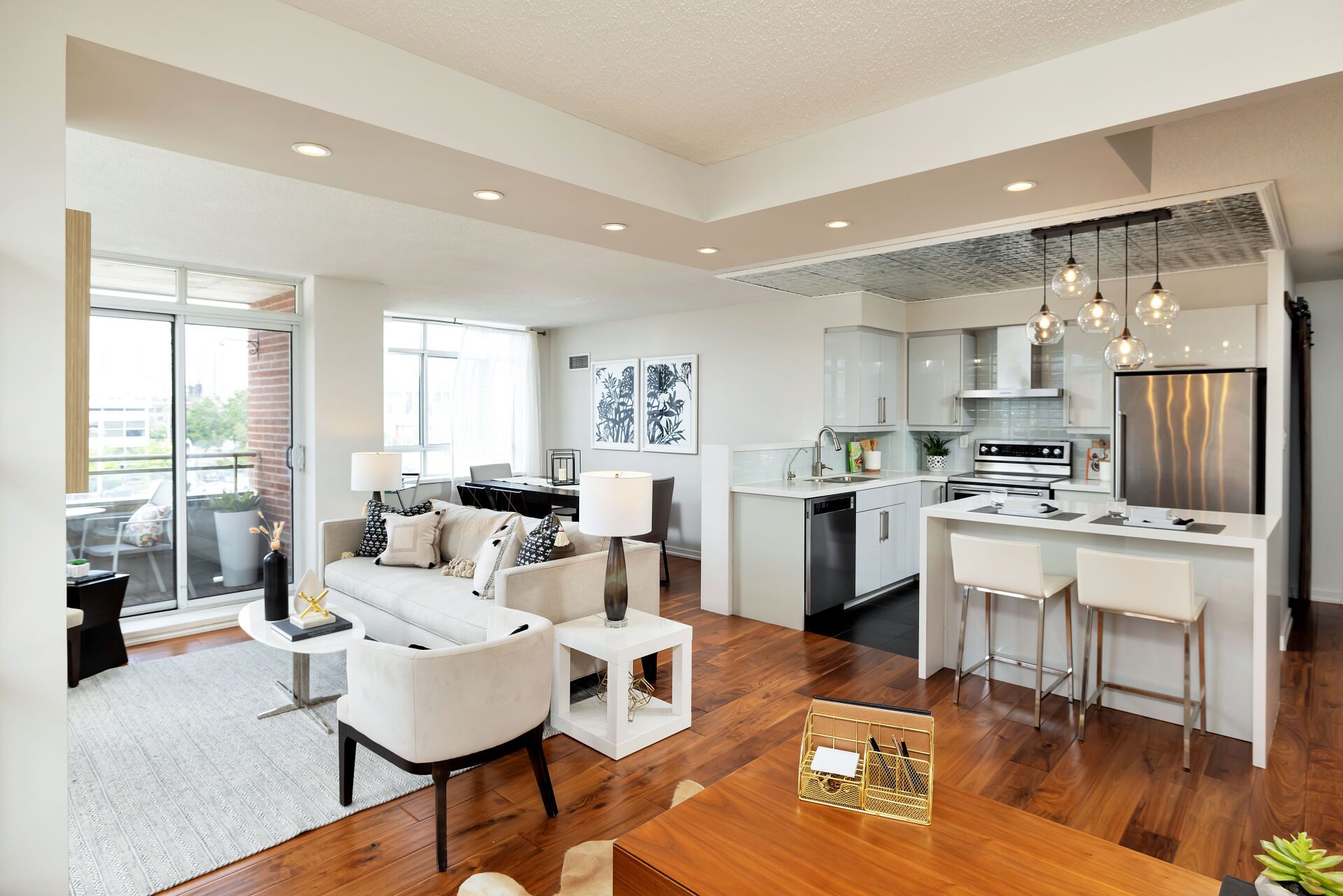We know how difficult it is to navigate the Toronto real estate market these days. Even us experts can’t predict exactly what will happen next. What we can do, is arm you with statistics and give you advice based on our experience. I’m Britt Huggins, part of the SO&Co. real estate team. I focus on not only Toronto real estate, but all surrounding areas. In today’s blog, I’m going to hone in on the Toronto Condo market, how it’s performed over the last year compared to other home types and provide you pointers to look out for when you are on the hunt to purchase!
Over the last year, we have witnessed several markets and home types take a hit with regards to price. When looking at the purchase price stats from September 2022 compared to September 2021 across all home types, the condo market was effected the least, dipping by approximately 2%. Let’s break it down by the average price in Toronto by property type and comparing September 2022 to September 2021:
Detached Average Price 09/2021: $1,778,928
Detached Average Price 09/2022: $1,585,589
Decrease of 10.9%
Freehold Town/Row Average Price 09/2021: $1,148,501
Freehold Town/Row Average Price 09/2022: $990,242
Decrease of 13.8%
Condo Town Average Price 09/2021: $837,047
Condo Town Average Price 09/2022: $831,798
Decrease of 6.3%
Condo Average Price 09/2021: $744,730
Condo Average Price 09/2021: $730,818
Decrease of 1.9%
With that said, the condo market was least effected by the ebbs and flows of the market. If you are on the hunt to purchase a condo in Toronto, take these useful tips into consideration when selecting a building and unit to buy:
1. Be Aware of Your Carrying Costs: This is an especially important tip for first-time home buyers. When buying a condo, you should consider the other fees that come along with condominium ownership. You will have to pay your mortgage, maintenance fees, taxes and insurance. While maintenance fees can really drive up your monthly budget, they are responsible for covering incredibly important things. Security, amenities, building insurance, building maintenance, some utilities, etc. These fees are calculated on square-footage. The larger the unit, the higher the fees. You will notice when searching through listings on MLS, the older the building, the higher the maintenance fee. This is due to a couple of things; firstly, older buildings naturally are going to have more things that need servicing and repair. Secondly, older units generally have larger floor plans. While newer buildings do have lower maintenance fees, you can expect these to rise. Make sure you are taking the time to budget these fees and not just your mortgage…because with zero mortgage, maintenance fees, taxes and insurance will still need to be paid!
2. Location: Let’s talk location! If you were to view the average purchase price of condos across the city, you will see location has a huge impact. For example, the average condo in the Bridal path is going to be much higher than the average price in Martingrove. While most Torontonian’s are aware of this, they may not be aware of what neighbourhoods are undergoing gentrification. Your local real estate specialist will have an idea of what developments are in the works and what future neighbourhoods are on the up and up!
3. Renters vs Owners: You are either purchasing your condo as an investment property or as your home. If you are looking to invest and rent, this point shouldn’t really effect your decision too much. However, if you are buying to live, you are going to want to do some research as to what percentage of the building is owner occupied vs rented. There are some condo buildings that are over 90% occupied by renters. Not that there is anything wrong with this when purchasing, but as a general rule of thumb, owners have pride in ownership and will take better care of their purchase. If you would like to know how to figure this number out, speak to a real estate specialist. They can either use rental statistics or review a status certificate.
4. Investment Appreciation Expectations: Real estate is likely the biggest purchase you will make in your life and we all go in with the expectation that this will appreciate. If you have followed the Toronto real estate market over the past five years, we have seen double digit appreciation rates on condos but we cannot base our expectations this. The average appreciation over a 4 year span is approximately 7%. To be on the safe side, when crunching numbers, base this on 3-5% appreciation rate and you will end up much happier with your return on investment.
5. Price Per Square-Foot: While calculating what a buildings cost per square foot will play a factor when you are determining the value of a condo, it isn’t always as cut and dry as it seems. There are many things that can make a smaller unit worth more per sqft than a unit on the medium to larger side. It’s all about the unit itself and the pros and cons which will really determine value. For example: the floor plan of the condo, is there a terrace, is parking included, what is usable square footage, etc. Layout can really make or break a condo. If 200 sqft is wasted on a hallway, this isn’t usable space and you are losing value. While this is a helpful method in determining value, don’t base your offer amount solely on that alone.
6. The “WOW” Factor: If you have seen a condo with a “wow” factor, you’ll probably remember it. It could be an amazing view of the city from high up in the sky, a rooftop pool (yes I have been to a unit that has it’s own personal pool), a fantastic layout, a boutique building, top of the line finishings, etc. The list goes on. In a real estate boom, the good, bad and the ugly will all sell; however, in a slower market, the boutique style buildings tend to sell quicker than the average, cookie-cutter Toronto condo. So if you are looking for something that holds value, look for something that can be leveraged as a “wow” factor.
7. High-rise vs. Boutique: This is a decision that should be make based on what is best for your lifestyle. There are advantages and disadvantages when purchasing one over the other. If you choose to go with the tall, cookie-cutter style buildings, you will likely benefit from amenities such as a fitness centre, sauna, pool, billiards, 24 hour security, fabulous views, etc. but you may end up with more neighbour issues, long elevator wait times, chaotic internet connections, etc. Maintenance fees tend to be more in buildings that feature several amenities, whereas, boutique buildings without the bells and whistles can come in with lower maintenance fees, less elevator wait times and more of a community feel. A big bonus of the boutique style buildings is that in slower markets, the boutique units generally sell faster!
8. Work With a Local Specialist: If you are looking in the Toronto market, work with a team that KNOWS the Toronto market. We know the ins and outs of the condos around the city and would be more than happy to help you find the right unit.
Feel free to reach out to one of our real estate experts!








